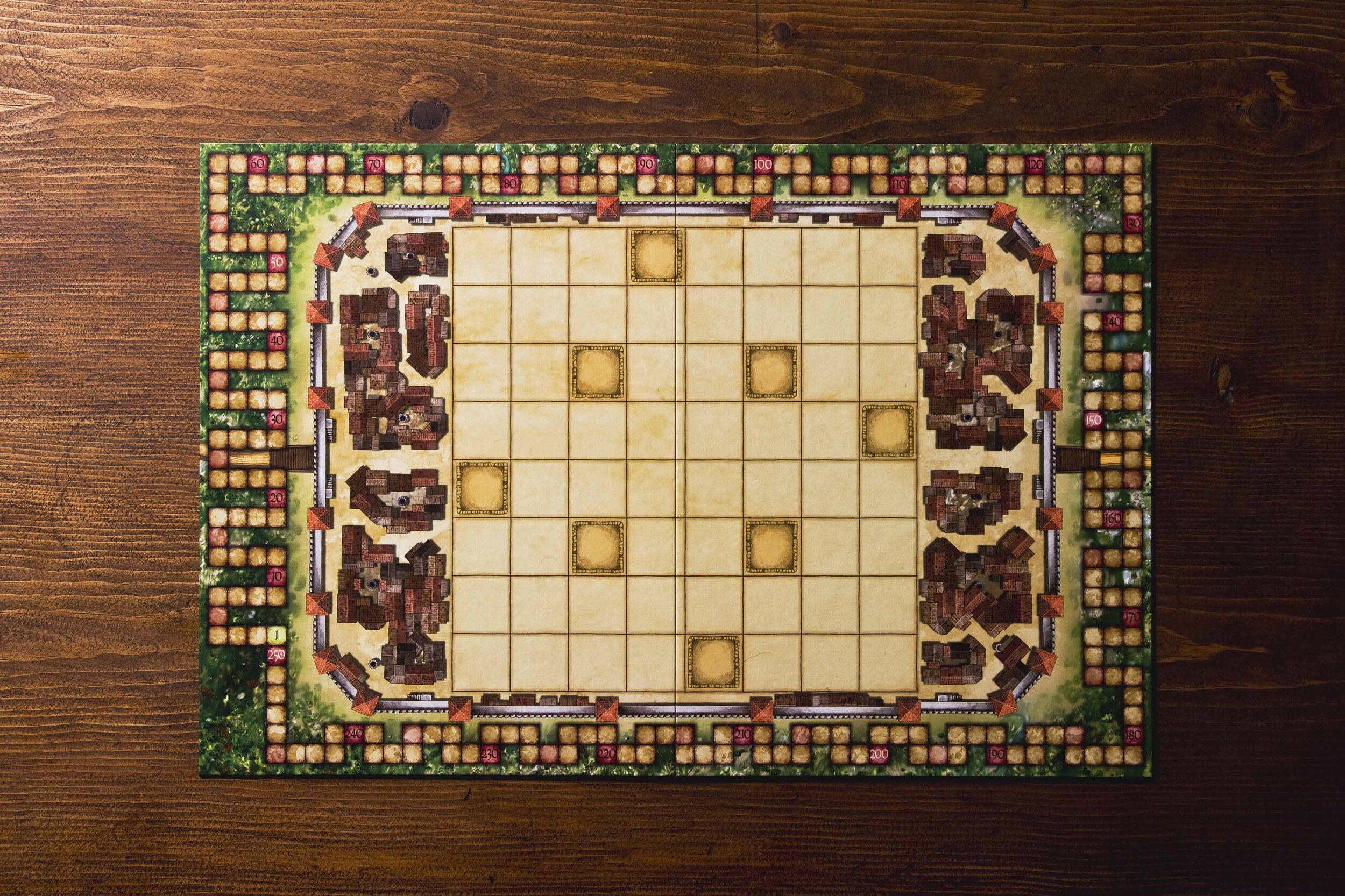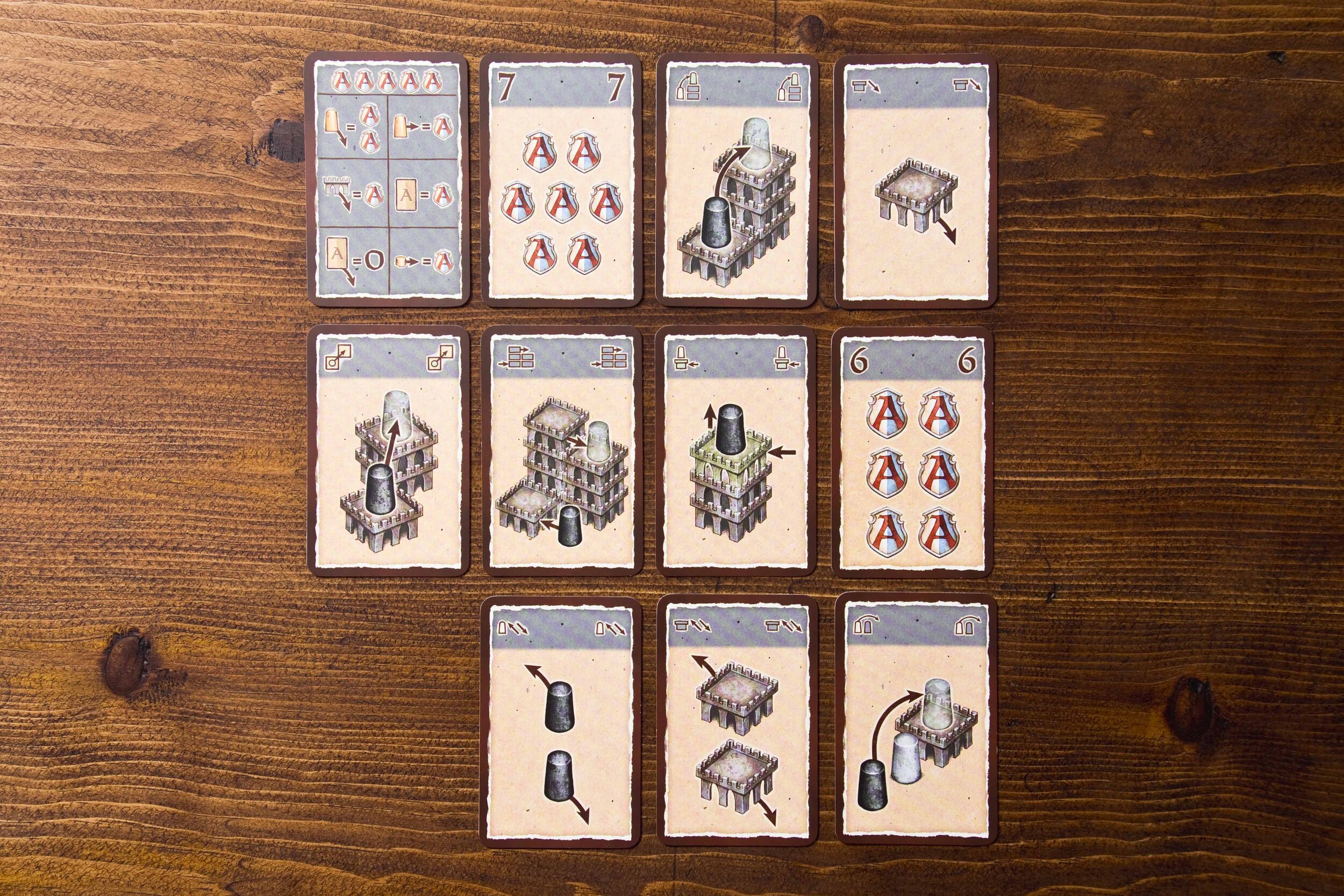Torres: A Classic Game with Old Foundations
Let’s Shoot Upwards in this Classic Tower Building Game
Torres Box (Rio Grande Games Version Here)
Published by: HUCH! Created by: Michale Kiesling & Wolfgang Kramer
I sure do love me some stacking. Give me a bunch of quality poker chips and you’ll soon find me fooling around, cajoling those round ceramic discs into clanking stacks. Clack-clack-clack-clack…on and on as a mantra to my idiosyncrasies with handy play things. Playing cards? Maybe I make a castle or two, however feeble the foundations might be. Pancakes? You betcha. My quirks infuriates my wife at times, but I can’t help it—except for the pancakes. She loves those.
So it’s no surprise I perked up when Torres came around asking me to stack plastic, molded towers. A calling card if I ever had one. If you read my Santorini review, you’d understand the beginnings of my fascination with stacking things upon things. Torres sure does insist on doing just that in an effort to create structures to gain the most points—and so I must.
How does it hold up as it comes up on its 20th anniversary after winning the 2000 Spiel des Jahres prize? Well, in short, it’s still captivating, but maybe not for everyone.
The Game Board
2 + 2 = 5
Created by the dynamic board game design duo of Michael Kiesling and Wolfgang Kramer, Torres can be described as an area control, three-dimensional tile laying, abstract game held together with a mortar of hand management and action points. It sounds like a mouth full of word vomit, but it all fits together, congruent, once you start playing, spilling its contents onto the board. How do you play? Well, you’re tasked with making towers of varying sizes increasing their surface area and height through tower segment placement. Then, you score depending on the positioning of your knights within those towers. It’s straightforward even though it has a smattering of mechanics.
Why does it perform neatly under so many mechanics—the simple stacking of tower blocks, the movement of your knights, the chase of the King’s castle, the acquisition of action cards? In one word: restrictions. Torres is about adhering to towering restrictions—and your guile to subverting those confines. That’s where it becomes an interesting brain teaser. If you’ve ever read the mind bending, spooky book House of Leaves the setting of that story is a house that’s bigger in the inside than the dimensions on the outside. In a way, to prosper in Torres, your turns must be bigger than the walls of which they are in.
Take for example the movement of your knights. In Torres, you start with a single knight. These knights allow you to claim points in a tower you or your opponents have built. The higher the placement of the knight in that tower, the more points you score. To get to those places, however, your knight can only move one space within the 8x8 grid and only orthogonally, but you can, with careful tower placements and knight movements, tunnel through a castle section in a straight line. Suddenly one space can turn into two, three, or more spaces traversed. A move bigger than its initial state.
In many ways, the other actions you take in Torres also have to deal with restrictions. Turns are restricted to 5 action points, points you use to purchase actions that allow you to do different things. Tower blocks are limited to three sections every turn, new knights cost two (TWO!!) action points and can only be placed next to your own and only on equal or lower levels. Castles can only grow as tall as long as they don’t exceed the spaces of its base and may never touch orthogonally thus never merging into gigantic structures.
Restrictions permeate this game. It’s only through careful consideration and managing your options that you push a turn into something much more meaningful. It’s like turning a simple piece of paper into an origami crane. Complex, but only through the careful folds turned into edges. And it’s through the Action Cards that we get even more interesting, creative folds to be made to an otherwise tame piece of paper.
house of cards
The existence of the action cards are the linchpin of making mountains out of mole hills with your turns. These cards can be purchased for one action point (but only one per turn) and used in the subsequent turn. These cards allow for moves outside the normal rules.
Action Cards
For instance, there are cards that allow for six or seven actions points in a single turn, thus extending what sort of actions you can create in one turn. There are others that allow different movement types your knights can engage in. Others still allow for special movements of tower sections incapable otherwise.
If you want your turns to be more than their initial worth, obtaining action cards and having options can bring scoring possibilities much quicker than not having action cards in the first place. In other words, it’s imperative that you obtain these precious resources to weave them into your tactics for more points. A savvy opponent will utilize them, so should you.
So great, what then is stopping anyone from buying this classic game? It has tactics, a brain teaser of a puzzle and it asks its players for clever ideas to its game play. It should be in your library, right?
Well…
no surprises
A Game in Progress
I couldn’t tell you with a straight face that this game is perfect and that everyone out there should buy it. Let me be clear; I like this game, no, I love Torres, but only because I tend to have a thing for games with granular rule sets that place manageable roadblocks on everything. I find it as a challenge that needs to be broken in some way. That being said, we are in 2020 now.
The process of gaining anything through action points might feel archaic to some. It’s an unnecessary hurdle to overcome and one that slows down the flow and pacing of the game. Waiting for someone to think on how to use those five points can introduce some serious AP. Again, I don’t mind it, but in 2020 it feels too prosaic. Games these days, at least abstract and gateway-ish, try to reduce the down time and get players making nimble turns getting to the core of their mechanics.
I can also state the beginning round can be underwhelming. We have to fill a board with towers, both in height and preferably in width, fill them with your own knights and gather action cards. There is a lot of set up for you to create heavier turns later on in the game. The beats in which you crescendo aren’t linear, but rather abrupt in the second half. It’s great when you get there, but it does need time to coalesce.
And yet…
2 Player Torres
to recap
I still like Torres, even after the aforementioned complaints, however small in my book. Get two players that know the ins and outs of Torres and most of those hindrances become moot after a while, since the players will snap into place fairly quickly. The game offers different variants that allow for more depth for those with ample knowledge. Also, as far as table presence come, Torres has few equals. Stacking, and building out tower sections spreading about can create some outstanding structures. Its verticality can command some attention, if somewhat drab in color palette.
Is this a title you should add to your game library? That depends on your tolerance for minutia in rules, specially in an abstract as this. Torres can be finicky, but I believe its puzzle outperforms those mechanical hurdles. On my table, it will always find a place, but I also understand its possible foils for others. Overall, it’s worth a look.












